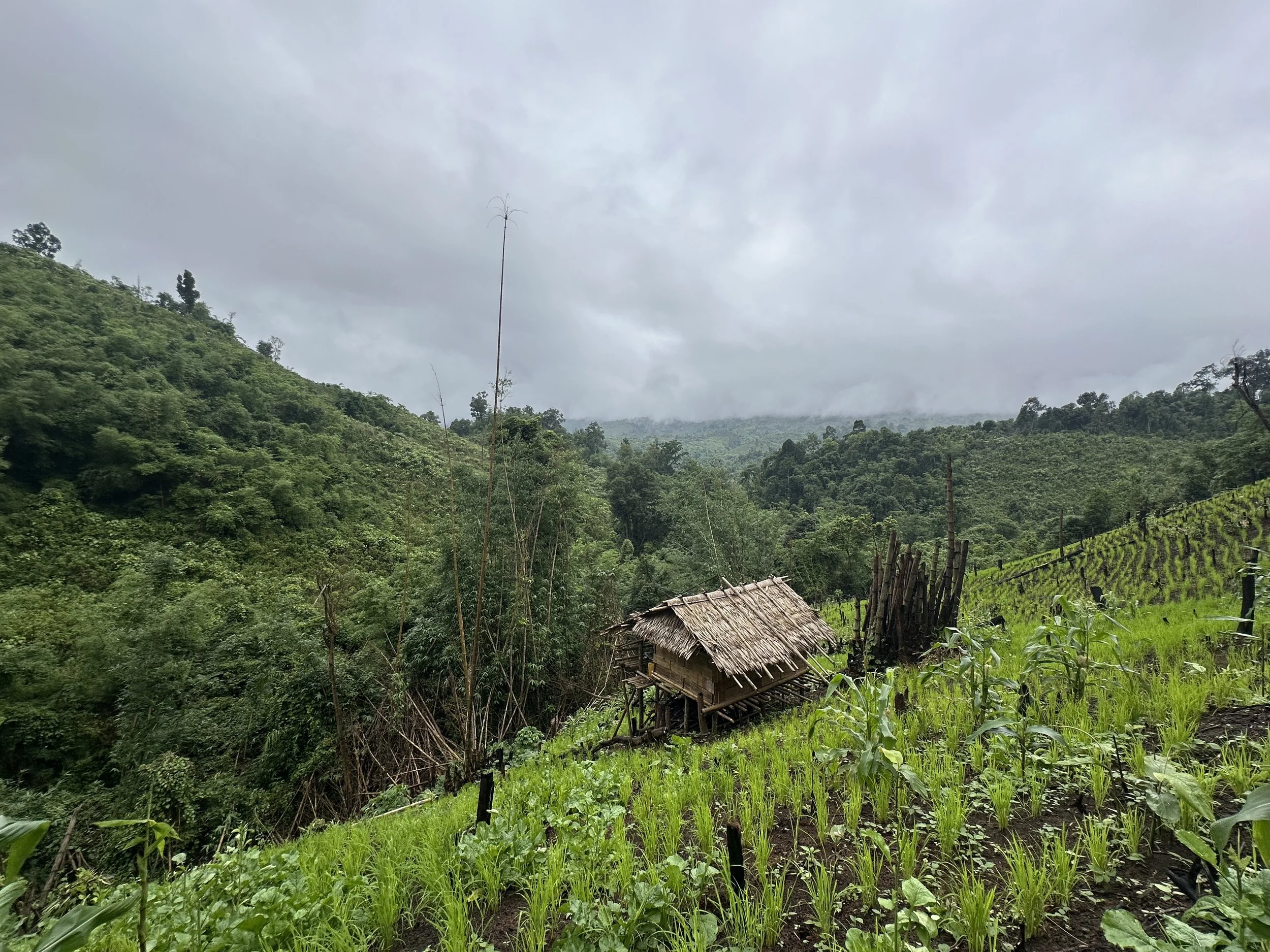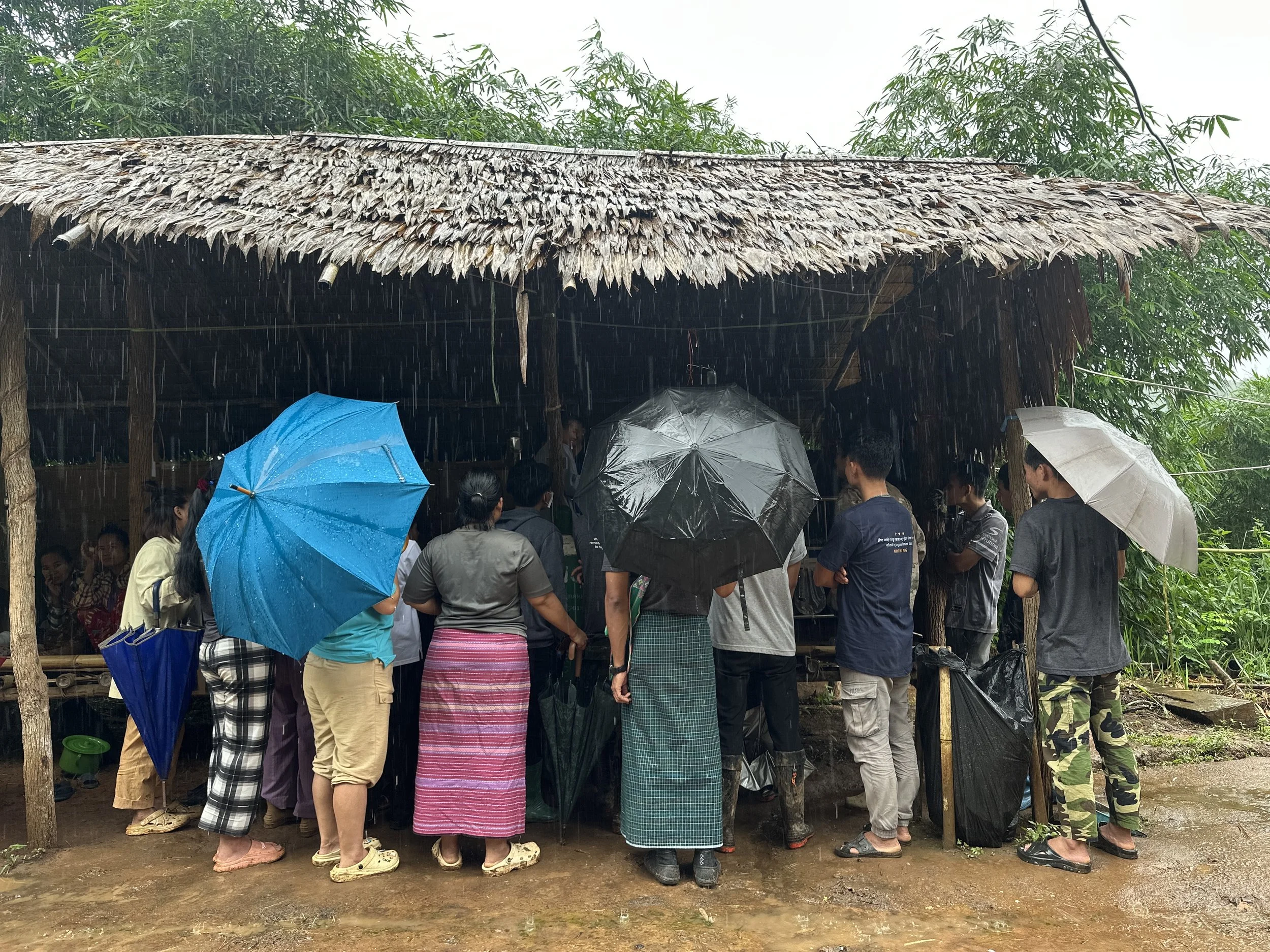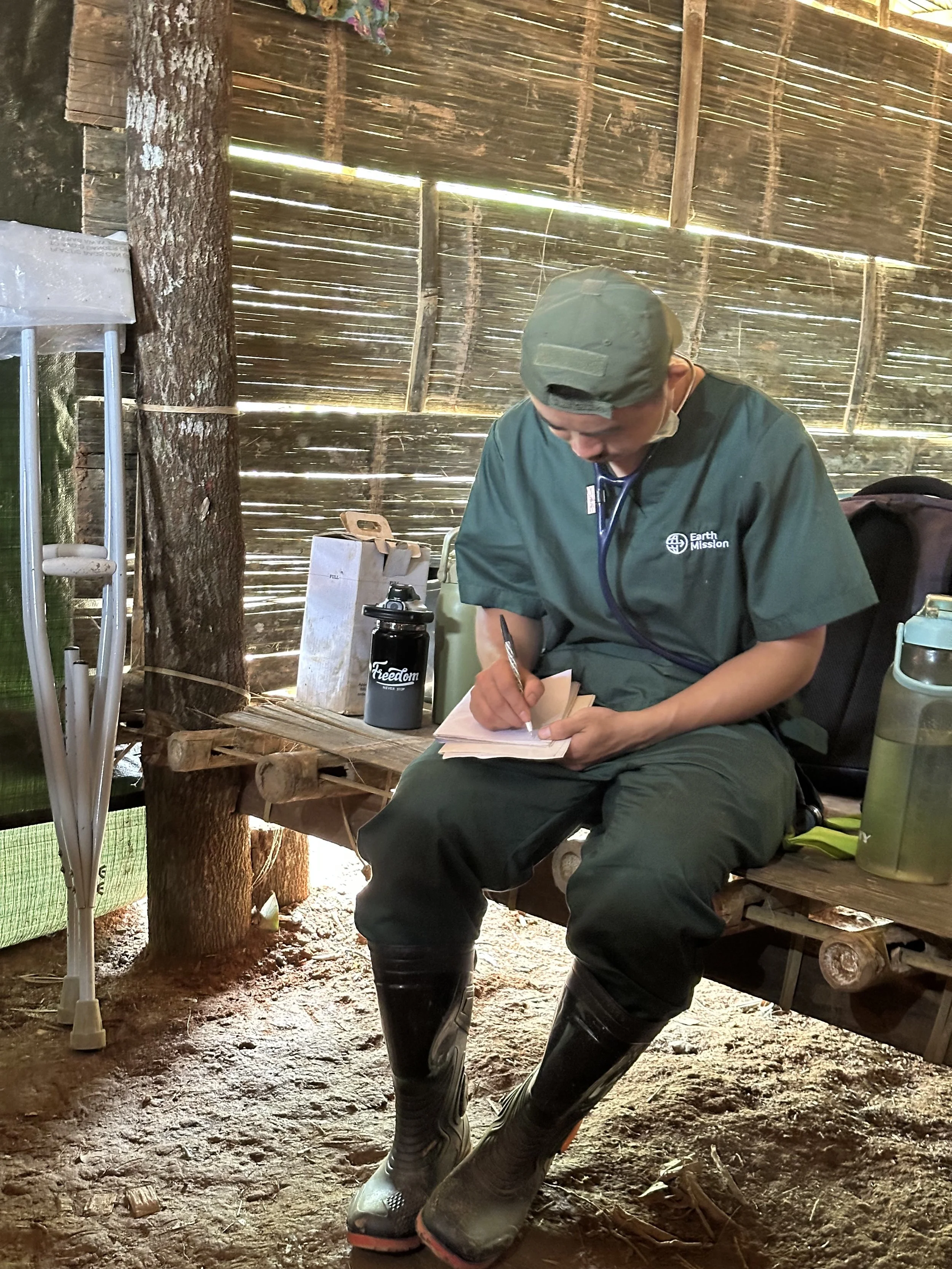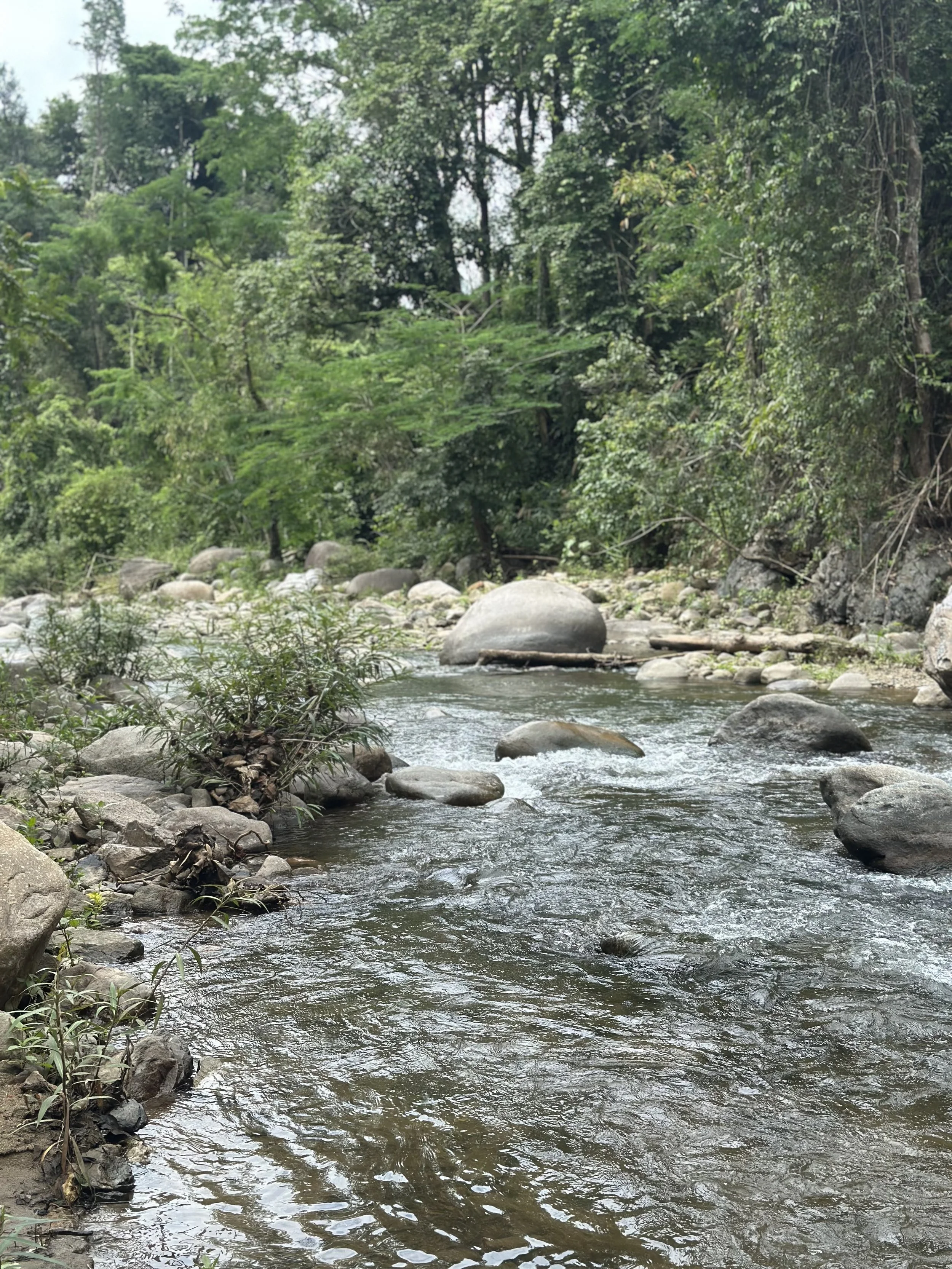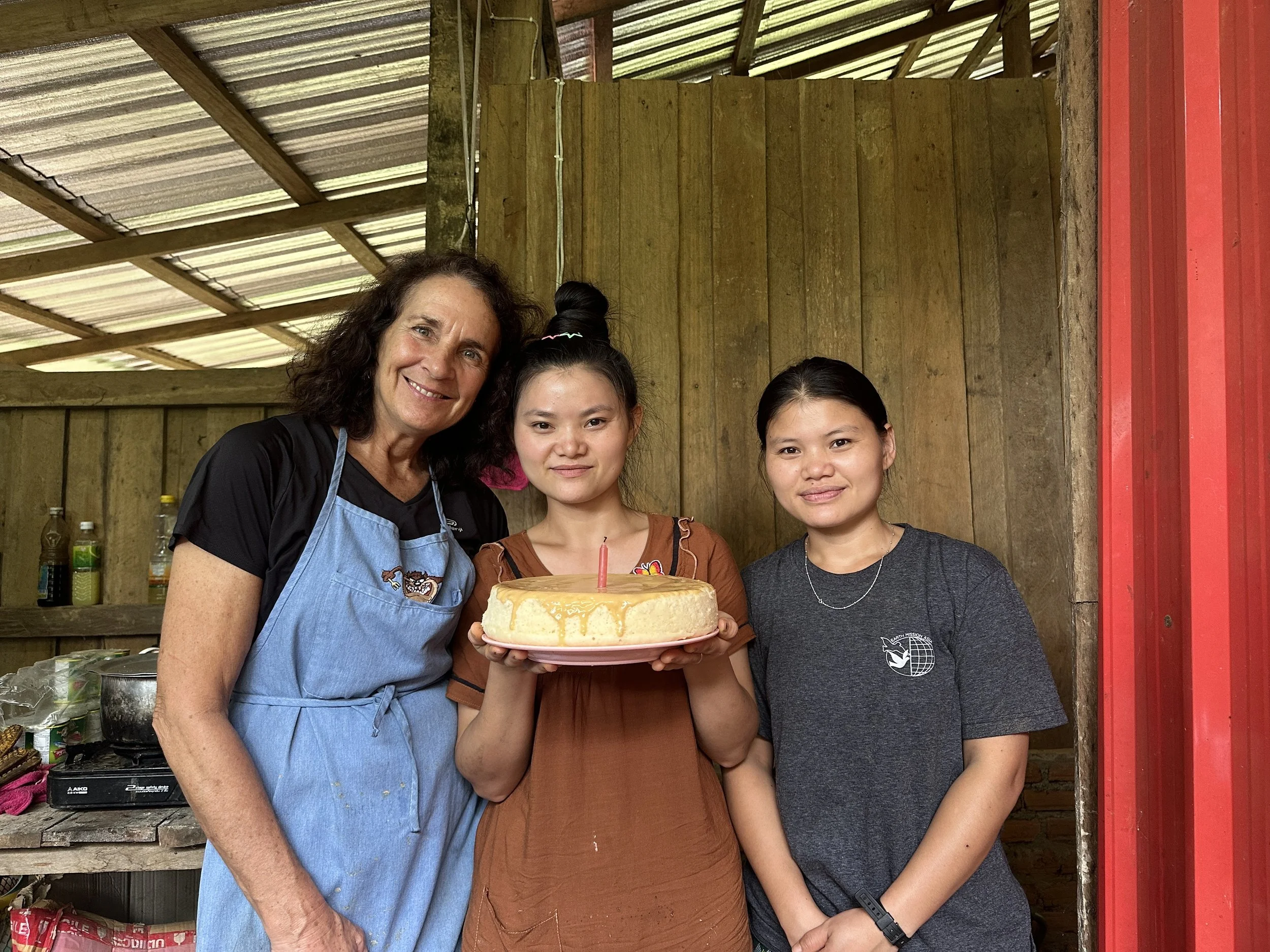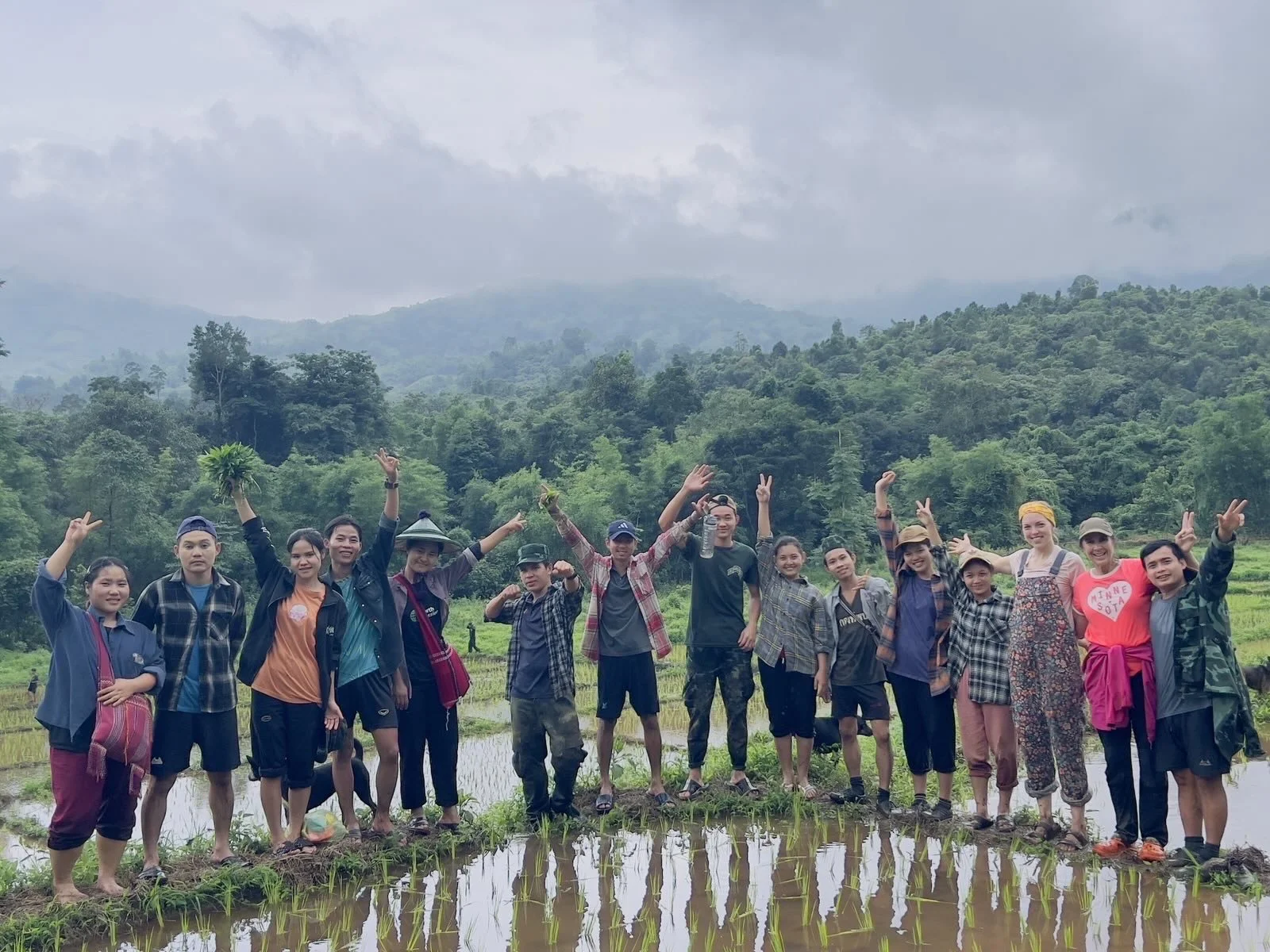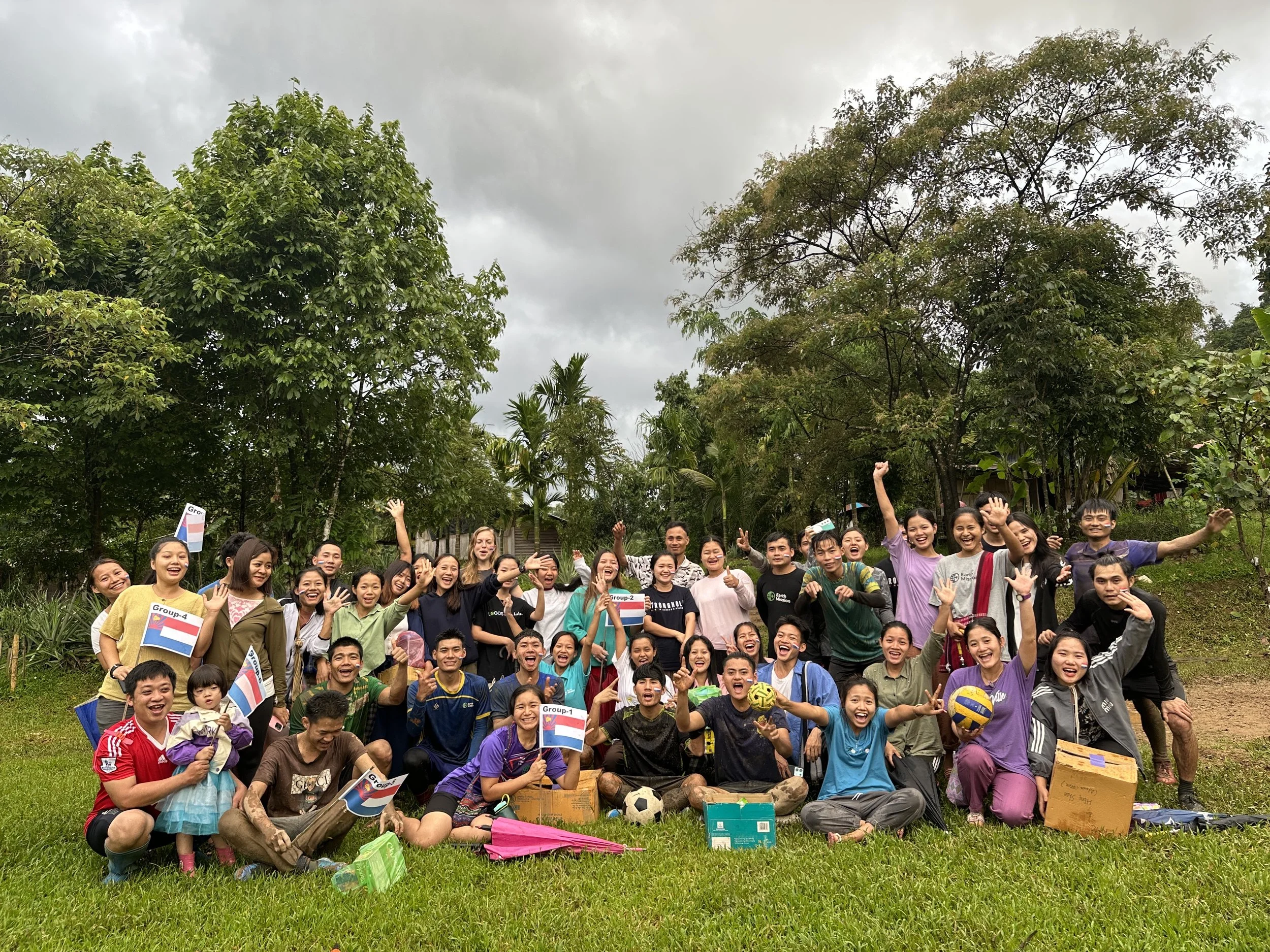Rainy Season Reflections
Above: Part of Bway’s story written in S’gaw Karen language: “The rain can’t stop us.”
Bway | Communication Manager
Time passes and goes on. Years change. Months go by. Older people have grown older, children are growing fast, and young ones are maturing into their responsibilities. When I look back to a few years ago when I first arrived at Rain Tree Clinic (RTC), almost everything has changed.
The RTC campus that once started small has now expanded five times its original size. It takes time to walk from place to place—you can no longer bump into each other by chance. Now, you have to make time to visit one another, unlike in the early days when everyone was just steps away. New buildings have appeared across the campus, and with them came the need for more trenches, dug for protection when airstrikes come. The population has grown from about 50 people to over 200. Everywhere you look, trees and fruits have been planted—durian, rambutan, apples, strawberries, jackfruit, longan, and countless others. The once-empty land now blossoms with life.
Almost everything has changed, except one thing—the rainy season.
The rainy season never fails to return, unchanged and familiar. I have always loved it, for as long as I can remember. It brings a cozy feeling mixed with warmth and coolness that no other season can give at the same time. I love the sound of the rain—it is my favorite lullaby at night. On weekends, lying in a hammock, wrapped in a warm blanket, with a book in my hand, a cup of hot tea beside me, and the rain falling outside—that is the best feeling in the world God has given me. There’s nothing like hot tea, a good book, and the sound of the rain together. Sometimes, I even wonder if God made the rainy season just for me—it fits my soul so perfectly. It calms me down. It is the one moment I wouldn’t trade for anything. It is my comfort zone, where my deepest longing meets me—something no person or possession can ever give me.
I often wonder, did Adam and Eve feel this same completeness with nature in the Garden of Eden? If Eden was their perfect peace, then my Eden is the rainy season in the deep jungle of Myanmar, where Rain Tree Clinic sits hidden among the trees.
If you’ve never experienced the rainy season in these remote mountains, it might be hard to understand this feeling. Let me explain! From June to the end of September, it feels as though all the water vapor from around the world gathers above this place—and it pours down relentlessly. Days and nights of endless rain, sometimes for two weeks straight. The sun appears only briefly—maybe a few minutes, maybe just seconds. Enough to tempt you to hang your laundry outside, but don’t be fooled—the rain will be back before you even finish. Your clothes stay wet for weeks.
As much as the rain is my comfort zone in my mind, reality is different. In these remote areas, people rarely understand what it means to truly be in a comfort zone. Here, being comfortable means simply getting to sleep through the night. But it is not even for some people.
Students diligently observe patient rounds despite the heavy rains.
At 2 a.m., the alarm clock rings. Outside, the rain pours steadily, cool winds singing their lullaby. Inside the campus kitchen, lights flicker on. Four of our cooks quietly rise to prepare meals for over 200 people. Even with wet firewood, the cooks never complain. They step beyond their comfort zone every single day, so we can stay in ours for just a little longer. Everyone else, except the night-duty team and a few patients, sleeps soundly. By 7 a.m., breakfast is ready, and by 8 a.m., the clinic is buzzing with life again.
Nobody wants to get out of bed in the rain—but we all do. The supplies team drives motorcycles for hours through muddy roads to bring food, medicines, and essentials, sometimes carrying motorbikes across swollen rivers to continue the journey. The engineering team is out in the rain, fixing medical machines, other equipment, and parts of the building damaged by the rain, making sure the electricity supply runs sufficiently for the whole campus. The medical team races through the downpour, building to building of different wards, caring for patients on the campus. Sometimes, they carry patients on foot for hours to refer the patients for advanced medical care, for days when the roads are too damaged for trucks to pass. When airstrikes fly overhead, we run to the muddy, rain-filled trenches for safety.
Night-duty medical staff assess a patient during a downpour outside.
A medical staff member pauses to record notes before his next task.
And even after all of that, we never stop. On weekends, or after a long workday, students and staff head out beyond the campus, into the forest, foraging for food—wild fruits, vegetables, edible plants—whatever the jungle provides. The jungle feeds us, and we never miss the chance to gather what it offers, rain or shine. Some finish other personal chores, and business needed to be done. The rain never bothers us. It’s just part of life here.
Yet, in the rain, we still study, still treat patients, still train PA students, still push forward for the clinic to run smoothly, resisting the rain’s invitation to stay curled up in a hammock with hot tea. As the rain never stops, we never stop thriving.
But we do it all with smiles. Because no matter how hard it gets, the rain adds its own beauty to everything. It refreshes the land, cools the air, feeds the fruit trees, and fills the rivers. It brings a quiet rhythm to our busy, challenging lives.
The rainy season here isn’t just a season. It’s a way of life. It’s our reminder that beauty and struggle live side by side—and that in the heart of the jungle, even through the storms, we never stop growing.
Susan | Education Instructor
Today I was having a bad day, which is not always a bad thing; it makes me walk away from campus and climb into the mountains to be alone with God. I decided to hike along the road to nowhere. The road to nowhere is a nice wide, dirt and clay path that was intended to be a shortcut to the next large town to our west, but towering cliffs of granite, too hard for the excavator to break up, put an end to that road construction process about half-way up the mountain. I think God built that road for me. The road to nowhere has no active rice farms on it this year. It doesn’t go through any villages. It is a beautiful silent reminder that man’s best laid plans are not always God’s plans.
The path is about 3 meters wide and is the golden red color of an iron-rich dirt. On either side of the road, at the start, is jungle. It is like walking into a secret garden. Because it is rainy season, wherever there is a basin in the road structure, there are big pools of water too concentrated with clay particulates to judge their depths. To me they always look to be a few inches deep, but then I come across one filled with buffalo lounging up to their necks in stinky, muddy, spa-like buffalo good-ness. The buffalo gaze at me with their large tranquil eyes and big floppy ears and dare me to interrupt their relaxation experience.
As I travel further on, I get to the relics of this year’s Year 1 Boot Camp physical training apparatus. On my right and left along the road there are structures for students to climb over, to climb under, to climb onto, to dodge, to weave through, to just plain be exhausted by. The structures are dark and heavy with rain, mold, and mildew. They are a testament to the perseverance of Karen mountain people.
Continuing my climb up the mountain, I arrive at a defunct rice farm from last season. Where last year there was row upon row of tall, slender green cereal grasses swaying with the breeze, this year the jungle has begun its ever-vigilant repopulation of the fire-razed mountainsides. In the sparsely vegetated, undulating terrain of an old farm you can see the many dilapidated seasonal farm huts where farmers and their families would have spent their rainy season tending the farm. Now they are skeletons of interwoven bamboo sagging heavily toward the earth and no longer providing any protection from sun or rain. Somewhere nearby each of these homes is what I like to call a “Jacob’s ladder.” They are nice sturdy bamboo ladders that point straight up into the air about 3 meters or more. I think they are for threshing rice, but I am not sure. They seem to me to be feats of structural engineering ingenuity that defy gravity.
I was hoping that one of the huts would have held more tightly to its roof of interlocking half bamboo pieces to provide relief from the rain, but the force of mother nature is strong here. The best I found was some bamboo stalks still tied firmly enough to their elevated foundation that I could sit out of the mud and talk to God, while I took in the beauty around me as the day began its descent into dusk. In the distance, I could see the bright green rice fields of this year’s crop with their inhabited huts leaking smoke into the sky as families cooked their evening meal. To my west, the road to nowhere continues its futile climb upward into cloud-covered mountain tops.
“The Lord is my shepherd, I lack nothing. He makes me lie down in green pastures (on old bamboo structures). He leads me beside quiet waters (of stinky buffalo-filled mud).”
- Psalm 23:1-2
On my way back to Rain Tree Clinic I pass a content-looking, solitary old man on his way up the mountain. I hope he too found the peace he was looking for.
Chelsea | PA Surgical Services
As the rainy season rivers deepen in Karen State, one must fight the jungle daily. Mold coats everything: wood, bamboo, plastic, paper, cloth, leather, skin. On days with less rain, the groundskeeper cuts back new growth around the walking paths. Locals laugh at the many wounds on my legs from mosquito bites that have festered; the Karen people say they have tough "buffalo skin" but foreigners always get eaten. Only the heaviest of rain gives a reprieve from the voracious mosquitoes that eagerly spread malaria and dengue fever. Nothing is truly dry, just less damp, and surgical sterility is questionable at best. Spaces between toes must be powdered daily to prevent athlete’s foot. Microbes flourish and infections are the most prevalent pathology.
But as they say, if you can't beat 'em, join 'em! My kitchen looks like a microbiology lab full of fermentation projects: kombucha, tepache, tempeh, kimchi, and beer. The students frequently go out regularly to forage for vegetables, and I am slowly learning to see the wild turmeric, ginger, culantro, dogfruit, bamboo shoots, and fern fiddleheads. I'm thrilled that the avocado, curry leaf, fig, strawberry, mint, and coconut plants I brought are enjoying the daily rains alongside the jackfruit, durian, lime, mango, papaya and guava trees planted by those before me. There are many pineapples ripening across campus right now, providing some much-needed vitamin C and variety in our rations. Every pineapple top is re-planted so that our supply will increase exponentially each year.
There is a slow quiet in this season that could be construed as both cozy and melancholy, a mood only rainy weather can capture. The girls find time between tasks to weave and the boys pass around a guitar. Not much changes from day to day.
Today as I walked to the hospital in mud-caked sandals, I noticed a swarm of bees clinging to a low branch in tight formation to protect each other from the rain. They were silent, barely moving. Paused in place until they find a new home. The secret life of bees.
No one here has deep roots to this particular location. Not the students or the staff—even those who own the land have been here for less than one generation due to military pressure. There is always a murmur that we may have to move again. There are wars and rumors of war. Bombs and rumors of bombs, both here and abroad. There's nothing new under the sun.
So in this season we live quiet lives, taking care of each other, sharing our food and umbrellas. We are paused in place, waiting for a sunny day where we will keep moving, building enclaves of peace on the way to our eternal home.
Staff baking a cake for a community celebration.
Year 1 Physician Associate students and staff help a local farmer plant rice paddy.
Students and staff enjoy a muddy sports competition despite the rains.
“If we are going to be destroyed by an atomic bomb, let that bomb, when it comes, find us doing sensible and human things—praying, working, teaching, reading, listening to music, bathing the children, playing tennis, chatting to our friends over a pint and a game of darts—not huddled together like frightened sheep and thinking about bombs.” - C.S. Lewis

